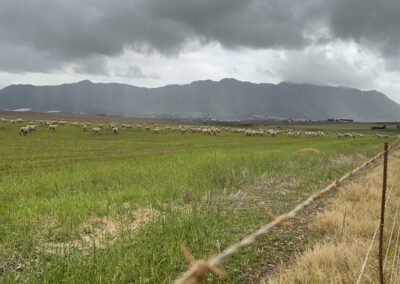Louise Naude.
Growth in South Africa’s GDP has stalled, yet significant opportunities to drive a deep and sustainable economic turnaround could be missed if we don’t pay attention.
Initiatives spearheaded by the Presidency, including the Jobs Summit this week, the Investment Summit later in the year, and the recently announced stimulus package are an opportunity to re-orientate the economy to deliver reduced inequality, create jobs and livelihoods, and advance industrialisation, while dealing with the geophysical and socio-economic implications of climate change.
The era of policy making with a blind spot around climate change must be brought to a close. We don’t have the money or time to waste on perversely locking the economy further into a carbon-intensive and climate-vulnerable path.
The Jobs Summit takes place on the eve of the release of the Intergovernmental Panel on Climate Change’s Special Report on Global Warming of 1.5 °Celsius on 8 October. Economic modelling in a publicly leaked draft of the full IPCC Special Report shows that the dangers for economic growth, particularly in developing countries, are significantly greater at average global warming of 2°C than at 1.5 °C.
If the greenhouse gas emissions produced by human activity continue on the current trajectory, warming is set to exceed 3°C, by far surpassing the abovementioned 1.5 °C by about 2040. Yet, if we act swiftly and together to make far-reaching changes to be globally carbon neutral by 2050, we can still keep warming below 1.5 °C.
The longer we take, the harder it will be, and the worse and more irreversible the implications.
South Africa will increasingly face trade impacts due to reduced demand for, and trade barriers against, our high-carbon and carbon-intensive exports, such as thermal coal, locally produced iron and steel, and combustion-engine vehicles. Already, the European Union requires a binding reference to the United Nations Paris Agreement in its trade deals.
Redirecting fossil fuel subsidies is an obvious way to start stimulating the emergence of a low-carbon economy and provide for social protection of affected workers. In the liquid fuels sector alone, South Africa’s fiscus hands fossil fuel producers between R6.4bn and R28bn per year, and forgoes between R35m and R4.7bn revenue through indirect subsidies.
This excludes the price support received by Sasol via the regulated fuel price. That’s the President’s stimulus package pretty much funded right there, without having to take monies from education, health, social grants and the like.
Cutting coal is central to a climate solution in the country and globally, and re-skilling and re-deploying workers in high carbon-emitting sectors is critical. We should guard against a new economic path being shaped by the perspectives of carbon-causing companies serving their special interests behind a smokescreen of overnight job losses.
An article published on Fin24 reports that South Africa’s Standard Bank and multinational Standard Chartered Bank have adopted policies to stop funding any new coal-fired power plants. Lower investment risk is starting to swing away from carbon-intensive to lower carbon, and a tipping point will leave the country and investors with stranded fossil fuel assets and business models, and accelerating job losses.
Both the science and economic trends are clear that climate action is urgent. All government programmes and expenditure, including the President’s stimulus package, should pull in a low-carbon direction, and private investors and lenders would be well advised to do so too.
Not to do so is perverse, shoring up economic and business models that undermine development.
The required profound decoupling of development from fossil fuels and other causes of emissions opens up the opportunity to address other deep-seated systemic features of South Africa’s economy. However, there is no guarantee that a transition to a low-carbon economy will do so unless explicitly managed by a developmental state, and driven by businesses and labour with foresight. WWF advocates a Just Transition Taskforce spearheaded by the Presidency, and housed within The National Economic Development and Labour Council (Nedlac).
The flip side of a necessary winding down of the role of fossil fuels in our economy will be the opportunities to be found in a low-carbon economy, which is where the greatest potential for economic development and exponential returns on investment off a low base lie. Decisive and swift action in this direction can create a competitive advantage for South African businesses ahead of the pack.
Here are a few ideas:
• Focus on the growing market for metals and minerals necessary for manufacturing ‘clean’ technologies.
• Beneficiate minerals used to make electric and hybrid vehicles, and localise the assembly and manufacturing of these vehicles.
• Localise production of water treatment and water conservation technologies.
• Re-use industrial and household waste as inputs for manufacturing. (Moves to formalise waste economies must involve informal waste workers.)
• Adopt climate-smart agricultural crops and practices which conserve soil carbon and reduce water use, to expand food security and rural livelihoods.
Certainly, cutting coal is central to a climate solution in the country and globally, and fortifying workers in high carbon-emitting sectors, is critical. A Nedlac task team on the carbon tax is focusing on plans for the workforce and businesses in exposed sectors.
We should guard against a new economic path being shaped by the perspectives of carbon-causing companies serving their special interests behind a smokescreen of overnight job losses.
But a fixation on a fossil fallout means we are not facing forward to greenfield job creation and intensification, and risk keeping the economy stuck in the doldrums as the world passes us by.
The workforce must be skilled in anticipation of participation, job creation must be decent, women’s under-employment can be addressed, job-intensive business models need to be pursued. The Jobs Summit needs to build climate considerations into all job creation and investment initiatives. The Summit’s agenda is to align efforts of every sector and every stakeholder behind the imperative of job creation – let that be climate-smart job creation within a just transition.



